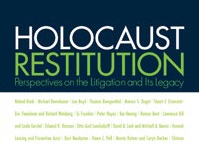“Holocaust Restitution” - Book Review
Holocaust Restitution - Perspectives on the Litigation and Its Legacy
Edited by Michael J. Bazyler and Roger P. Alford
Holocaust Restitution is the first volume to present the Holocaust restitution movement directly from the viewpoints of the various parties involved in the campaigns and settlements. Now that the Holocaust restitution claims are closed, this work enjoys the benefits of hindsight to provide a definitive assessment of the movement (NYU Press).
Review by Jan Peczkis, Chicago
This book highlights the cases involving Swiss Bank and German companies. It includes a testimony by Judge Edward R. Korman. However, the most interesting information is of an indirect nature, and that is the focus of my review.
Holocaust restitution: all about Jewish politics, Holocaust survivors secondary
In the media and in political discourse, Holocaust restitution is usually framed in terms of justice and compassion for Holocaust survivors - often with a few melodramatic sob stories thrown in. It is a winner. After all, who could be such an ogre as to refuse aid to the traumatized, destitute, long-denied Holocaust survivors?
It is eye-opening to realize that the Luxembourg Agreement (1952) could easily have done nothing for Holocaust survivors! Arie Zuckerman quips, “However, as far as Ben-Gurion was concerned, the needs of the hour overrode the intense feelings and the wounded pride that the agreement cause. Nevertheless, during the negotiation with Germany Ben-Gurion felt that it was necessary to distinguish between the acceptance of indemnities for the building of the State of Israel, a country that was absorbing Holocaust survivors, and private property restitution and compensation. It is fair to say that if not for the German condition that obligated the Israeli government to issue monthly indemnities to the injured Holocaust survivors, all the money would have been directed towards building Israel’s economy and none of the survivors would have been personally compensated by the government.” (pp. 323-324).
In other words, Jewish political leaders, left to their own devices, would have given none of the massive German reparations monies to Holocaust survivors. Now they (or their descendants) have the audacity to accuse Poland (and other prospective targets of attempted Holocaust-Industry shakedowns) of showing a lack of compassion to Holocaust survivors. The crocodile tears are flowing.
Now consider the restitution of private properties, heirless properties, and communal properties. The insufficient allocation of 1950s German monies for any or all these, for whatever motives, on David Ben-Gurion’s part, does not translate into a 21st-century liability or obligation on Poland’s part!
The USA and the European Union as tools for promoting Jewish interests at Poland’s expense
Poles had long suspected that Jewish influence in the USA, and in the European Union, is being exploited, by the Holocaust Industry, to re-victimize Poland: To bully Poland into paying for German crimes and for the consequences of German crimes. This is now actualized in print.
The statements of Stuart E. Eizenstat are priceless, “If returning communal property is difficult, getting back confiscated private property taken by the Nazis during World War II and/or nationalized by the Eastern European communist countries after the war is often even more difficult. Nowhere is this more evident than in Poland, now a member of both NATO and the European Union. More than a decade and a half after the fall of the Berlin Wall, Poland, traumatized by the potential cost of returning properties or compensating their owners, particularly Polish Jews, has no private property law. Its government has tried time and again but has difficulty coming up with a formula. Poland is now considering a compensation fund of around 15 percent of the value of the property but would exclude any properties in Warsaw from the legislation. Here again, diplomatuc intervention by the United States and by the EU is essential to achieve some justice.” (p. 305).
Jewish influence and the fundamental inequality of victims seeking justice in court
Defenders of Holocaust-related restitution allege that the same process is available to non-Jews that had been exploited or wronged in the past. [Think of the Aesop’s fable of the Fox and the Stork. Both animals were on an “equal footing” because, after all, they were eating from the same dish.] While true in theory, it is far from the truth in practice.
Authors Morris Ratner and Caryn Becker ask this introductory question, “Unfortunately, American courts have not proved to be the path to justice for victims of non-Holocaust-era- historical wrongs. Why did the Nazi-era cases not produce a wave of additional success stories for other victims of historical wrongs?” (p. 345).
In a roundabout way, Ratner and Becker acknowledge that Jewish influence in government and media was crucial, if not decisive. They elaborate that, “Additionally, media attention, which played a key role in the Holocaust cases and was intimately linked to the willingness of politicians and regulators to expend political capital on behalf of Holocaust victims, has been far less intensive in the post-Holocaust-litigation context.” (p. 352).
In fact, the difference in media coverage, between Holocaust-related and non-Holocaust-related grievances, was as night and day. Ratner and Becker comment, “While thousands of articles appeared in mainstream papers during the apex of Holocaust litigation, fewer than 150 stories were published about the plight of the braceros, and only hundreds appeared about the ‘comfort women’ and Japanese slave labor cases, with many of the stories appearing in local rather than national papers.” (pp. 352-353).
AUTHORS
Michael J. Bazyler is Professor of Law and The “1939” Society Law Scholar in Holocaust and Human Rights Studies at the Dale E. Fowler School of Law, Chapman University.
Roger P. Alford is Associate Professor of Law at Pepperdine University School of Law. He is a former senior legal Advisor for the Swiss Claims Resolution Tribunal in Zurich.


